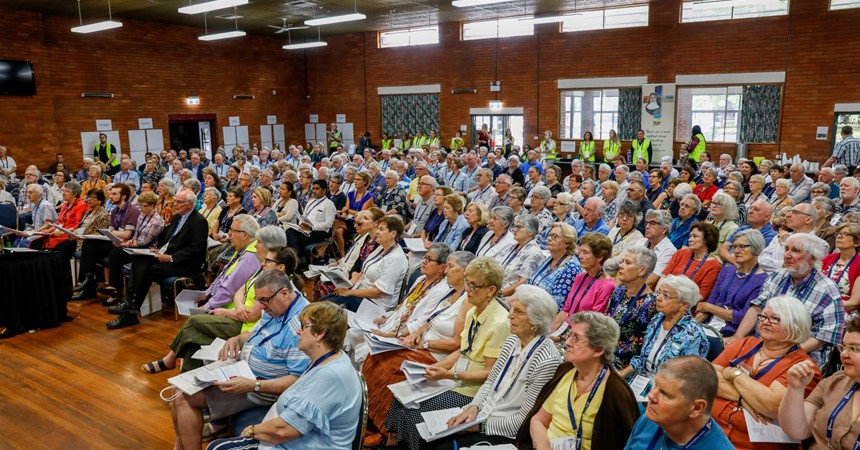The 1992/93 Synod affirmed the role of the Diocesan Pastoral Council as the regular forum for the Bishop to seek and receive the advice of laity on pastoral matters. That Synod put forward a structure of parish, regional and diocesan pastoral councils. Parish Pastoral Councils provided representatives to the Regional Pastoral Council and the Regional Pastoral Councils provided representatives to the Diocesan Pastoral Council. These representatives were to ensure the effective and efficient communication inwards and outwards across the Diocese. At times this structure worked very well. However, often Parish and/or Regional Pastoral Councils did not function or did not function well enough to provide a representative to the Diocesan Pastoral Council.
In recent years, Bishop Bill has renamed and restructured the Diocesan Pastoral Council. The new name, “Council for Mission”, reflects Pope Francis’ call in “The Joy of the Gospel” that the whole Church be focused on mission. The Council for Mission is a large group of 25 people who are appointed on the basis of their gifts and because they represent the diversity within the Diocese. There are seven people representing the leadership of the Diocese and its agencies (Catholic Schools and CatholicCare), 12 women, a couple of young adults but mainly middle aged and older people, people from different parishes (although mainly from the lower Hunter), a member of the Aboriginal ministry, a member of an ethnic community, one member of a Religious Institute and two priests. The Council describes itself as a representative group not a group of representatives. Once we convene as a Council our priority is the Diocese, not the group we “represent”.
The Council for Mission is a key strategic advisory group to the Bishop. It investigates, considers, and recommends actions in response to pastoral issues in the diocese. The Bishop participates in Council for Mission meetings and will often make a decision on a Council recommendation during these meetings.
During 2020, the Council for Mission met four times (twice via video-conference). Each meeting starts with a report from the Bishop on current pastoral issues, clergy/pastoral appointments, pastoral and Diocesan agency projects, national pastoral issues including the Plenary Council. The meeting then looks at other pastoral issues – some of these have come from Diocesan councils and some are led by working parties established by the Council for Mission. Pastoral issues addressed by the Council in 2020 included:
- COVID-19 – its impact and Church response;
- Organising the Diocesan Synod 2019-21);
- Reviewing the effectiveness of the Council for Mission;
- Homelessness and Church response;
- Formation and support of women in the Diocese;
- Post-school ministry in the Diocese; and
- Modern slavery and Church response.
How the Council operates is just as important as what it achieves. The Council aims to be a model of synodality by practising: participation, open discussion, respect for diversity, decision making by discernment, co-responsibility, solidarity and a mission-focus. This synodality should be obvious in the conduct of Council meetings and in the Council’s interactions with others in the Diocese.
Given the positive role of our Council for Mission, it is surprising that a 2019 survey found that only 10 of the 30 dioceses in Australia have such a council. It is also concerning that some of these councils are only meeting once or twice per year. Our Diocese can thank God that we have a Bishop who values collaboration and that we have people who are willing and able to work with him on our Council for Mission.

